Report on Entrepreneurship and Small Business Management - Consultancy
VerifiedAdded on 2021/02/19
|15
|4791
|389
Report
AI Summary
This report, prepared for a consultancy firm, analyzes various types of entrepreneurial ventures, including small businesses, scalable ventures, large company entrepreneurship, and social entrepreneurship, highlighting their similarities and differences. It examines the impact of micro and small businesses on the UK economy, emphasizing their contribution to employment and turnover. The report also explores the significance of SMEs in fostering social economy growth, focusing on job creation, poverty reduction, and the role of social enterprises. Furthermore, it delves into the characteristics, traits, and skills of successful entrepreneurs, the influence of personality on motivation, and how background and experiences can either hinder or promote entrepreneurial endeavors. The report concludes with a comprehensive overview of the subject matter, providing valuable insights into the entrepreneurial landscape.

ENTREPRENEURSHIP AND SMALL
BUSINESS MANAGEMENT
BUSINESS MANAGEMENT
Paraphrase This Document
Need a fresh take? Get an instant paraphrase of this document with our AI Paraphraser
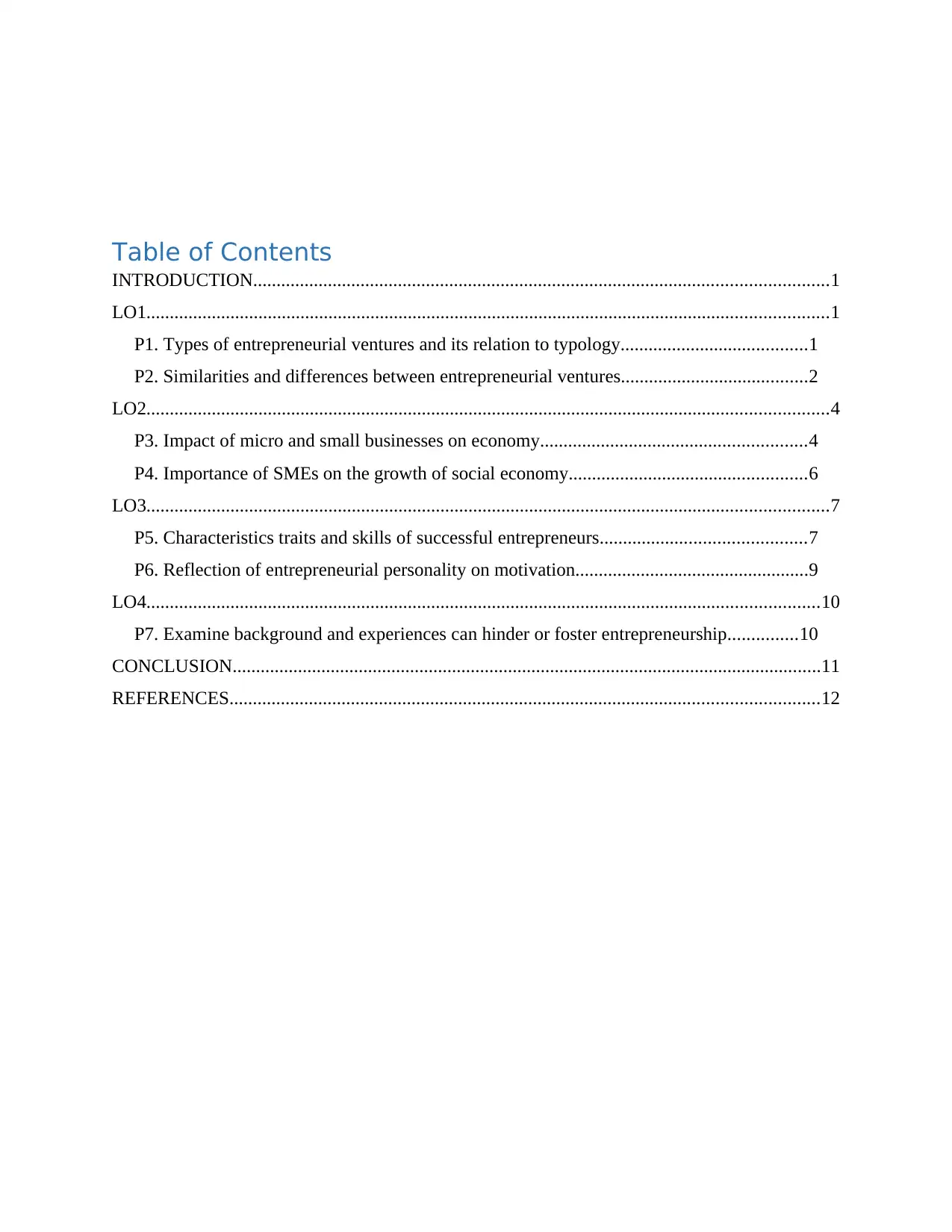
Table of Contents
INTRODUCTION...........................................................................................................................1
LO1..................................................................................................................................................1
P1. Types of entrepreneurial ventures and its relation to typology........................................1
P2. Similarities and differences between entrepreneurial ventures........................................2
LO2..................................................................................................................................................4
P3. Impact of micro and small businesses on economy.........................................................4
P4. Importance of SMEs on the growth of social economy...................................................6
LO3..................................................................................................................................................7
P5. Characteristics traits and skills of successful entrepreneurs............................................7
P6. Reflection of entrepreneurial personality on motivation..................................................9
LO4................................................................................................................................................10
P7. Examine background and experiences can hinder or foster entrepreneurship...............10
CONCLUSION..............................................................................................................................11
REFERENCES..............................................................................................................................12
INTRODUCTION...........................................................................................................................1
LO1..................................................................................................................................................1
P1. Types of entrepreneurial ventures and its relation to typology........................................1
P2. Similarities and differences between entrepreneurial ventures........................................2
LO2..................................................................................................................................................4
P3. Impact of micro and small businesses on economy.........................................................4
P4. Importance of SMEs on the growth of social economy...................................................6
LO3..................................................................................................................................................7
P5. Characteristics traits and skills of successful entrepreneurs............................................7
P6. Reflection of entrepreneurial personality on motivation..................................................9
LO4................................................................................................................................................10
P7. Examine background and experiences can hinder or foster entrepreneurship...............10
CONCLUSION..............................................................................................................................11
REFERENCES..............................................................................................................................12
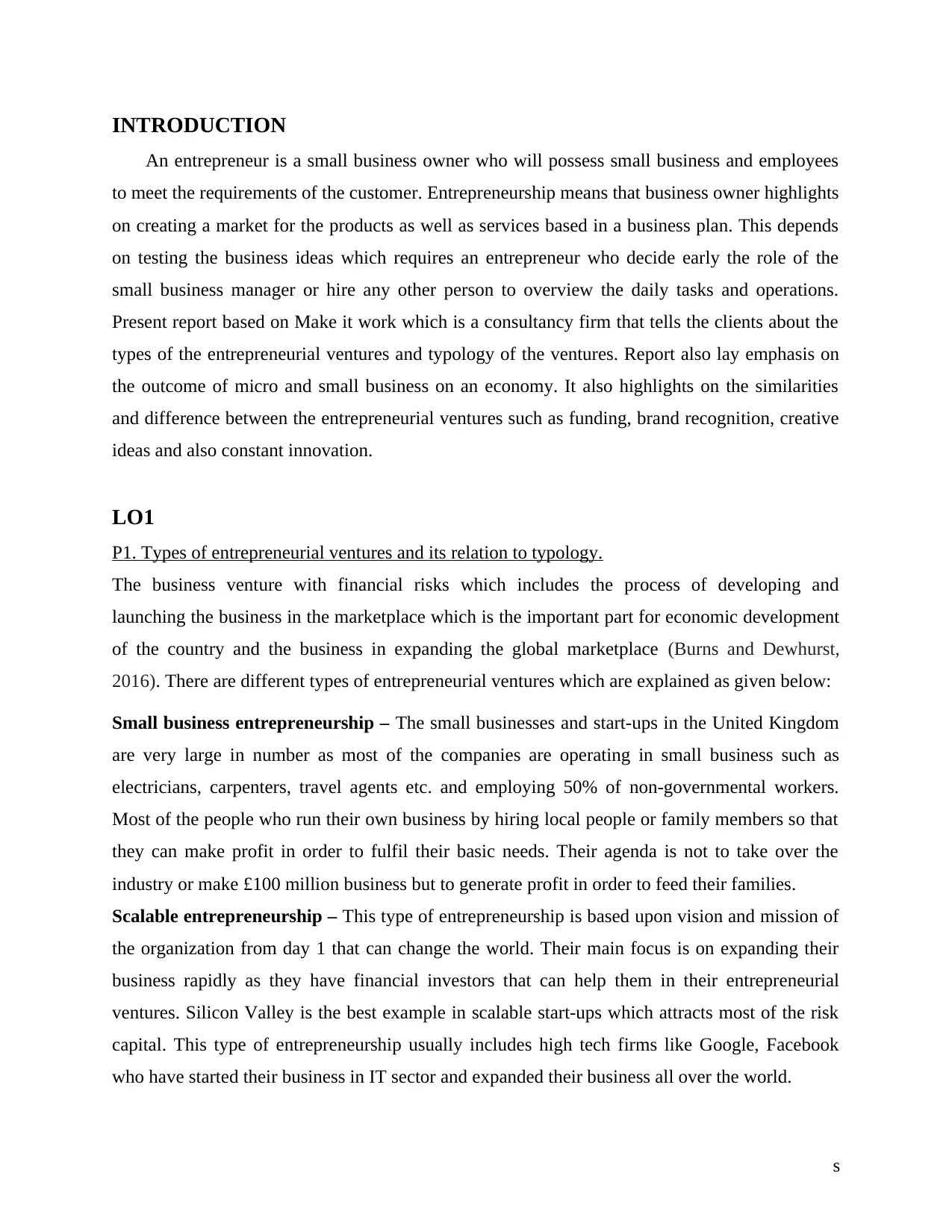
INTRODUCTION
An entrepreneur is a small business owner who will possess small business and employees
to meet the requirements of the customer. Entrepreneurship means that business owner highlights
on creating a market for the products as well as services based in a business plan. This depends
on testing the business ideas which requires an entrepreneur who decide early the role of the
small business manager or hire any other person to overview the daily tasks and operations.
Present report based on Make it work which is a consultancy firm that tells the clients about the
types of the entrepreneurial ventures and typology of the ventures. Report also lay emphasis on
the outcome of micro and small business on an economy. It also highlights on the similarities
and difference between the entrepreneurial ventures such as funding, brand recognition, creative
ideas and also constant innovation.
LO1
P1. Types of entrepreneurial ventures and its relation to typology.
The business venture with financial risks which includes the process of developing and
launching the business in the marketplace which is the important part for economic development
of the country and the business in expanding the global marketplace (Burns and Dewhurst,
2016). There are different types of entrepreneurial ventures which are explained as given below:
Small business entrepreneurship – The small businesses and start-ups in the United Kingdom
are very large in number as most of the companies are operating in small business such as
electricians, carpenters, travel agents etc. and employing 50% of non-governmental workers.
Most of the people who run their own business by hiring local people or family members so that
they can make profit in order to fulfil their basic needs. Their agenda is not to take over the
industry or make £100 million business but to generate profit in order to feed their families.
Scalable entrepreneurship – This type of entrepreneurship is based upon vision and mission of
the organization from day 1 that can change the world. Their main focus is on expanding their
business rapidly as they have financial investors that can help them in their entrepreneurial
ventures. Silicon Valley is the best example in scalable start-ups which attracts most of the risk
capital. This type of entrepreneurship usually includes high tech firms like Google, Facebook
who have started their business in IT sector and expanded their business all over the world.
s
An entrepreneur is a small business owner who will possess small business and employees
to meet the requirements of the customer. Entrepreneurship means that business owner highlights
on creating a market for the products as well as services based in a business plan. This depends
on testing the business ideas which requires an entrepreneur who decide early the role of the
small business manager or hire any other person to overview the daily tasks and operations.
Present report based on Make it work which is a consultancy firm that tells the clients about the
types of the entrepreneurial ventures and typology of the ventures. Report also lay emphasis on
the outcome of micro and small business on an economy. It also highlights on the similarities
and difference between the entrepreneurial ventures such as funding, brand recognition, creative
ideas and also constant innovation.
LO1
P1. Types of entrepreneurial ventures and its relation to typology.
The business venture with financial risks which includes the process of developing and
launching the business in the marketplace which is the important part for economic development
of the country and the business in expanding the global marketplace (Burns and Dewhurst,
2016). There are different types of entrepreneurial ventures which are explained as given below:
Small business entrepreneurship – The small businesses and start-ups in the United Kingdom
are very large in number as most of the companies are operating in small business such as
electricians, carpenters, travel agents etc. and employing 50% of non-governmental workers.
Most of the people who run their own business by hiring local people or family members so that
they can make profit in order to fulfil their basic needs. Their agenda is not to take over the
industry or make £100 million business but to generate profit in order to feed their families.
Scalable entrepreneurship – This type of entrepreneurship is based upon vision and mission of
the organization from day 1 that can change the world. Their main focus is on expanding their
business rapidly as they have financial investors that can help them in their entrepreneurial
ventures. Silicon Valley is the best example in scalable start-ups which attracts most of the risk
capital. This type of entrepreneurship usually includes high tech firms like Google, Facebook
who have started their business in IT sector and expanded their business all over the world.
s
⊘ This is a preview!⊘
Do you want full access?
Subscribe today to unlock all pages.

Trusted by 1+ million students worldwide
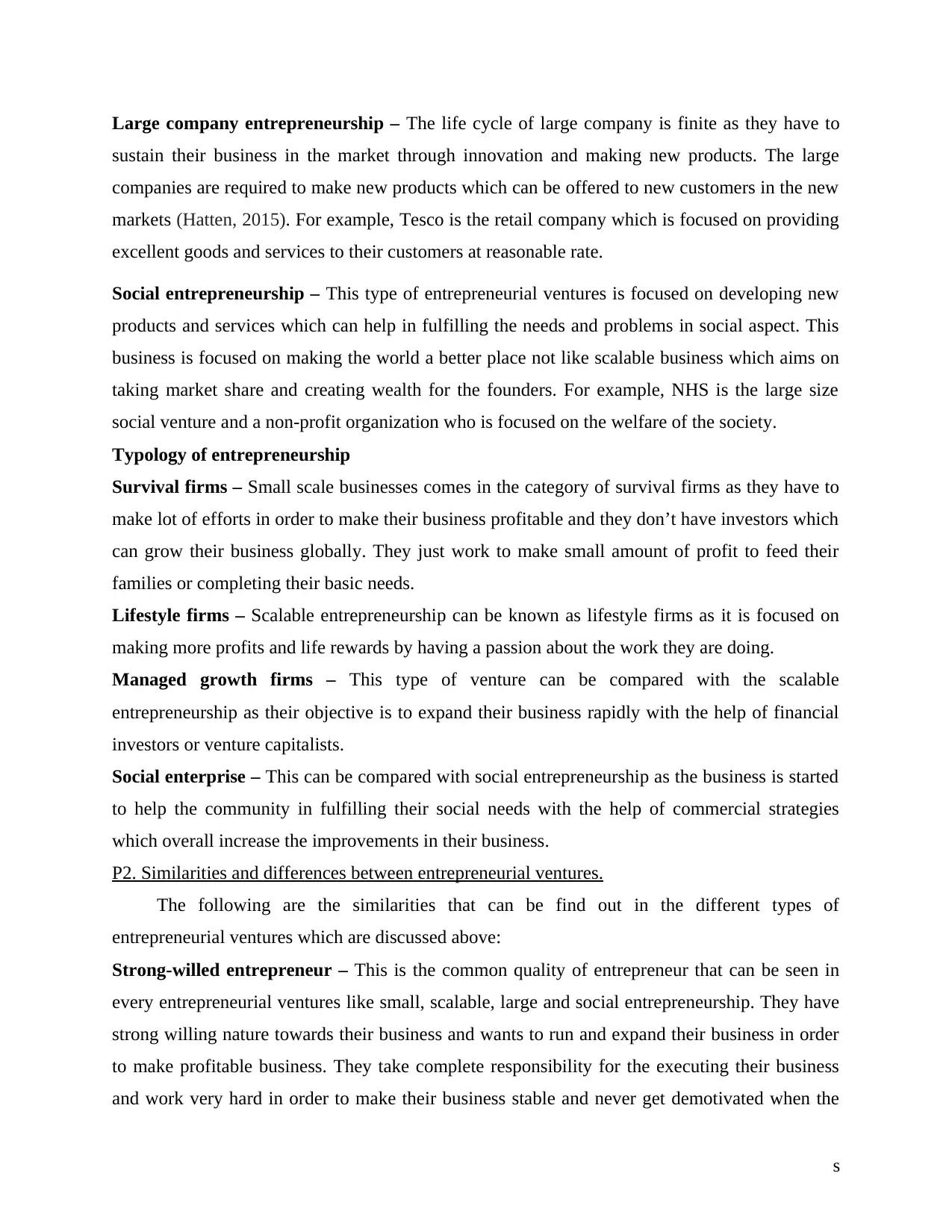
Large company entrepreneurship – The life cycle of large company is finite as they have to
sustain their business in the market through innovation and making new products. The large
companies are required to make new products which can be offered to new customers in the new
markets (Hatten, 2015). For example, Tesco is the retail company which is focused on providing
excellent goods and services to their customers at reasonable rate.
Social entrepreneurship – This type of entrepreneurial ventures is focused on developing new
products and services which can help in fulfilling the needs and problems in social aspect. This
business is focused on making the world a better place not like scalable business which aims on
taking market share and creating wealth for the founders. For example, NHS is the large size
social venture and a non-profit organization who is focused on the welfare of the society.
Typology of entrepreneurship
Survival firms – Small scale businesses comes in the category of survival firms as they have to
make lot of efforts in order to make their business profitable and they don’t have investors which
can grow their business globally. They just work to make small amount of profit to feed their
families or completing their basic needs.
Lifestyle firms – Scalable entrepreneurship can be known as lifestyle firms as it is focused on
making more profits and life rewards by having a passion about the work they are doing.
Managed growth firms – This type of venture can be compared with the scalable
entrepreneurship as their objective is to expand their business rapidly with the help of financial
investors or venture capitalists.
Social enterprise – This can be compared with social entrepreneurship as the business is started
to help the community in fulfilling their social needs with the help of commercial strategies
which overall increase the improvements in their business.
P2. Similarities and differences between entrepreneurial ventures.
The following are the similarities that can be find out in the different types of
entrepreneurial ventures which are discussed above:
Strong-willed entrepreneur – This is the common quality of entrepreneur that can be seen in
every entrepreneurial ventures like small, scalable, large and social entrepreneurship. They have
strong willing nature towards their business and wants to run and expand their business in order
to make profitable business. They take complete responsibility for the executing their business
and work very hard in order to make their business stable and never get demotivated when the
s
sustain their business in the market through innovation and making new products. The large
companies are required to make new products which can be offered to new customers in the new
markets (Hatten, 2015). For example, Tesco is the retail company which is focused on providing
excellent goods and services to their customers at reasonable rate.
Social entrepreneurship – This type of entrepreneurial ventures is focused on developing new
products and services which can help in fulfilling the needs and problems in social aspect. This
business is focused on making the world a better place not like scalable business which aims on
taking market share and creating wealth for the founders. For example, NHS is the large size
social venture and a non-profit organization who is focused on the welfare of the society.
Typology of entrepreneurship
Survival firms – Small scale businesses comes in the category of survival firms as they have to
make lot of efforts in order to make their business profitable and they don’t have investors which
can grow their business globally. They just work to make small amount of profit to feed their
families or completing their basic needs.
Lifestyle firms – Scalable entrepreneurship can be known as lifestyle firms as it is focused on
making more profits and life rewards by having a passion about the work they are doing.
Managed growth firms – This type of venture can be compared with the scalable
entrepreneurship as their objective is to expand their business rapidly with the help of financial
investors or venture capitalists.
Social enterprise – This can be compared with social entrepreneurship as the business is started
to help the community in fulfilling their social needs with the help of commercial strategies
which overall increase the improvements in their business.
P2. Similarities and differences between entrepreneurial ventures.
The following are the similarities that can be find out in the different types of
entrepreneurial ventures which are discussed above:
Strong-willed entrepreneur – This is the common quality of entrepreneur that can be seen in
every entrepreneurial ventures like small, scalable, large and social entrepreneurship. They have
strong willing nature towards their business and wants to run and expand their business in order
to make profitable business. They take complete responsibility for the executing their business
and work very hard in order to make their business stable and never get demotivated when the
s
Paraphrase This Document
Need a fresh take? Get an instant paraphrase of this document with our AI Paraphraser
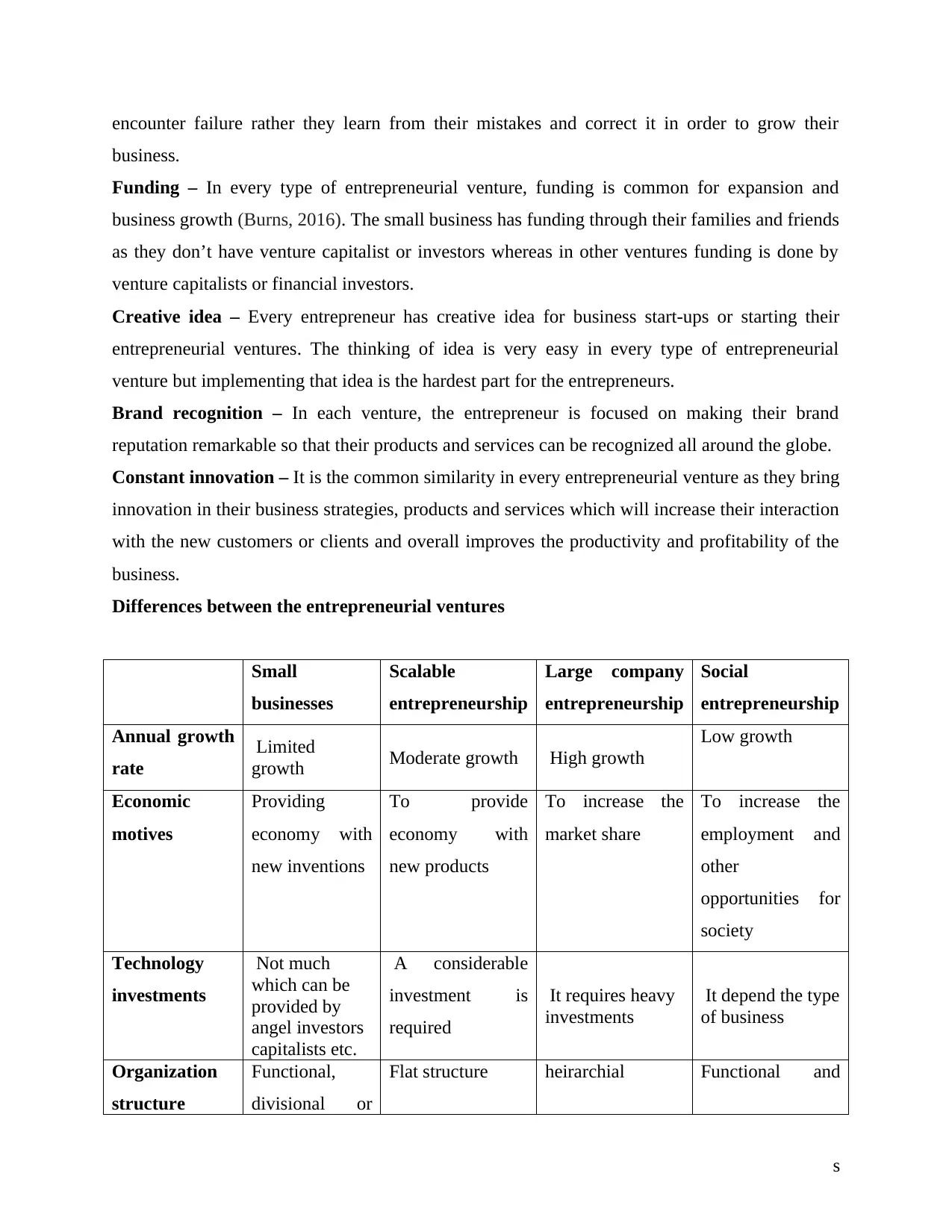
encounter failure rather they learn from their mistakes and correct it in order to grow their
business.
Funding – In every type of entrepreneurial venture, funding is common for expansion and
business growth (Burns, 2016). The small business has funding through their families and friends
as they don’t have venture capitalist or investors whereas in other ventures funding is done by
venture capitalists or financial investors.
Creative idea – Every entrepreneur has creative idea for business start-ups or starting their
entrepreneurial ventures. The thinking of idea is very easy in every type of entrepreneurial
venture but implementing that idea is the hardest part for the entrepreneurs.
Brand recognition – In each venture, the entrepreneur is focused on making their brand
reputation remarkable so that their products and services can be recognized all around the globe.
Constant innovation – It is the common similarity in every entrepreneurial venture as they bring
innovation in their business strategies, products and services which will increase their interaction
with the new customers or clients and overall improves the productivity and profitability of the
business.
Differences between the entrepreneurial ventures
Small
businesses
Scalable
entrepreneurship
Large company
entrepreneurship
Social
entrepreneurship
Annual growth
rate
Limited
growth Moderate growth High growth
Low growth
Economic
motives
Providing
economy with
new inventions
To provide
economy with
new products
To increase the
market share
To increase the
employment and
other
opportunities for
society
Technology
investments
Not much
which can be
provided by
angel investors
capitalists etc.
A considerable
investment is
required
It requires heavy
investments
It depend the type
of business
Organization
structure
Functional,
divisional or
Flat structure heirarchial Functional and
s
business.
Funding – In every type of entrepreneurial venture, funding is common for expansion and
business growth (Burns, 2016). The small business has funding through their families and friends
as they don’t have venture capitalist or investors whereas in other ventures funding is done by
venture capitalists or financial investors.
Creative idea – Every entrepreneur has creative idea for business start-ups or starting their
entrepreneurial ventures. The thinking of idea is very easy in every type of entrepreneurial
venture but implementing that idea is the hardest part for the entrepreneurs.
Brand recognition – In each venture, the entrepreneur is focused on making their brand
reputation remarkable so that their products and services can be recognized all around the globe.
Constant innovation – It is the common similarity in every entrepreneurial venture as they bring
innovation in their business strategies, products and services which will increase their interaction
with the new customers or clients and overall improves the productivity and profitability of the
business.
Differences between the entrepreneurial ventures
Small
businesses
Scalable
entrepreneurship
Large company
entrepreneurship
Social
entrepreneurship
Annual growth
rate
Limited
growth Moderate growth High growth
Low growth
Economic
motives
Providing
economy with
new inventions
To provide
economy with
new products
To increase the
market share
To increase the
employment and
other
opportunities for
society
Technology
investments
Not much
which can be
provided by
angel investors
capitalists etc.
A considerable
investment is
required
It requires heavy
investments
It depend the type
of business
Organization
structure
Functional,
divisional or
Flat structure heirarchial Functional and
s
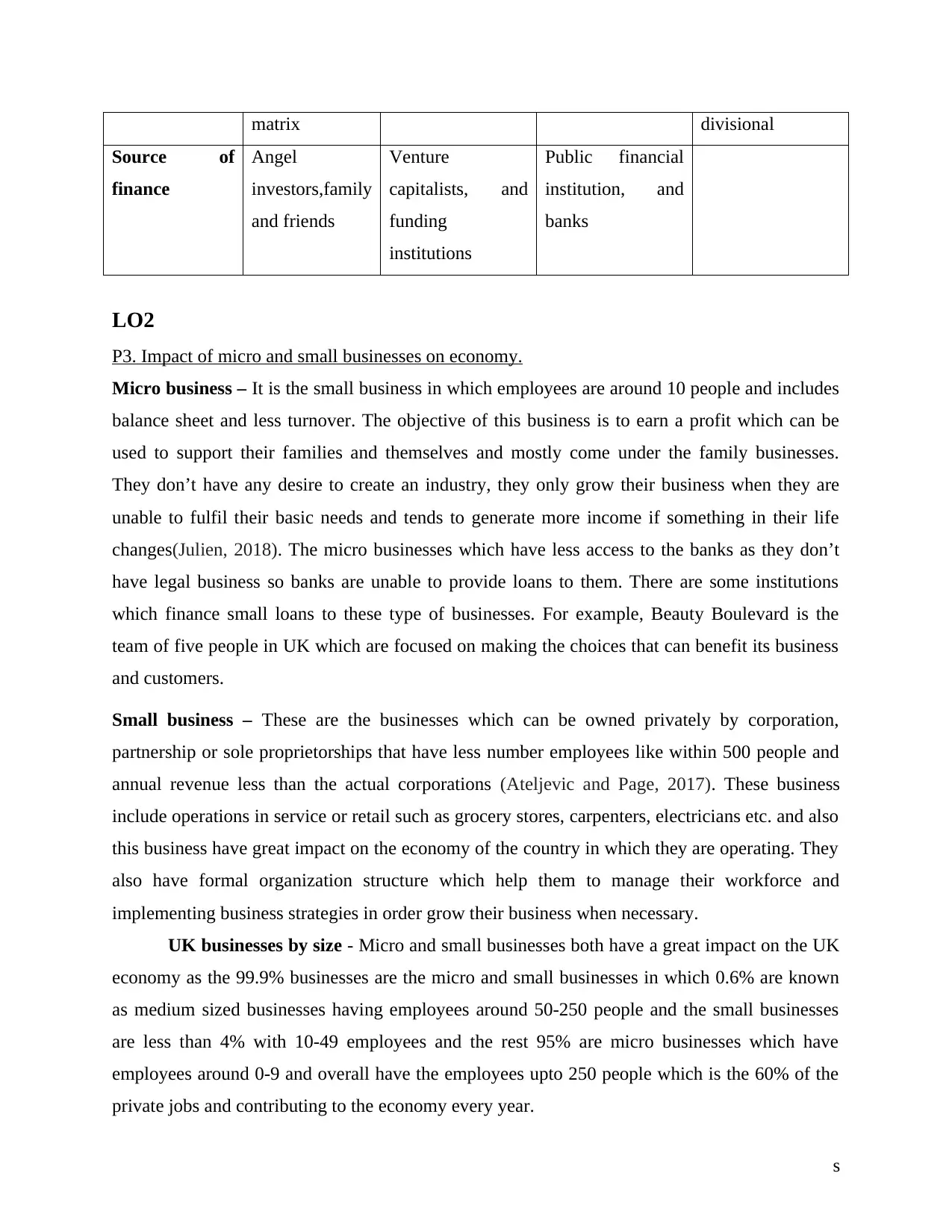
matrix divisional
Source of
finance
Angel
investors,family
and friends
Venture
capitalists, and
funding
institutions
Public financial
institution, and
banks
LO2
P3. Impact of micro and small businesses on economy.
Micro business – It is the small business in which employees are around 10 people and includes
balance sheet and less turnover. The objective of this business is to earn a profit which can be
used to support their families and themselves and mostly come under the family businesses.
They don’t have any desire to create an industry, they only grow their business when they are
unable to fulfil their basic needs and tends to generate more income if something in their life
changes(Julien, 2018). The micro businesses which have less access to the banks as they don’t
have legal business so banks are unable to provide loans to them. There are some institutions
which finance small loans to these type of businesses. For example, Beauty Boulevard is the
team of five people in UK which are focused on making the choices that can benefit its business
and customers.
Small business – These are the businesses which can be owned privately by corporation,
partnership or sole proprietorships that have less number employees like within 500 people and
annual revenue less than the actual corporations (Ateljevic and Page, 2017). These business
include operations in service or retail such as grocery stores, carpenters, electricians etc. and also
this business have great impact on the economy of the country in which they are operating. They
also have formal organization structure which help them to manage their workforce and
implementing business strategies in order grow their business when necessary.
UK businesses by size - Micro and small businesses both have a great impact on the UK
economy as the 99.9% businesses are the micro and small businesses in which 0.6% are known
as medium sized businesses having employees around 50-250 people and the small businesses
are less than 4% with 10-49 employees and the rest 95% are micro businesses which have
employees around 0-9 and overall have the employees upto 250 people which is the 60% of the
private jobs and contributing to the economy every year.
s
Source of
finance
Angel
investors,family
and friends
Venture
capitalists, and
funding
institutions
Public financial
institution, and
banks
LO2
P3. Impact of micro and small businesses on economy.
Micro business – It is the small business in which employees are around 10 people and includes
balance sheet and less turnover. The objective of this business is to earn a profit which can be
used to support their families and themselves and mostly come under the family businesses.
They don’t have any desire to create an industry, they only grow their business when they are
unable to fulfil their basic needs and tends to generate more income if something in their life
changes(Julien, 2018). The micro businesses which have less access to the banks as they don’t
have legal business so banks are unable to provide loans to them. There are some institutions
which finance small loans to these type of businesses. For example, Beauty Boulevard is the
team of five people in UK which are focused on making the choices that can benefit its business
and customers.
Small business – These are the businesses which can be owned privately by corporation,
partnership or sole proprietorships that have less number employees like within 500 people and
annual revenue less than the actual corporations (Ateljevic and Page, 2017). These business
include operations in service or retail such as grocery stores, carpenters, electricians etc. and also
this business have great impact on the economy of the country in which they are operating. They
also have formal organization structure which help them to manage their workforce and
implementing business strategies in order grow their business when necessary.
UK businesses by size - Micro and small businesses both have a great impact on the UK
economy as the 99.9% businesses are the micro and small businesses in which 0.6% are known
as medium sized businesses having employees around 50-250 people and the small businesses
are less than 4% with 10-49 employees and the rest 95% are micro businesses which have
employees around 0-9 and overall have the employees upto 250 people which is the 60% of the
private jobs and contributing to the economy every year.
s
⊘ This is a preview!⊘
Do you want full access?
Subscribe today to unlock all pages.

Trusted by 1+ million students worldwide
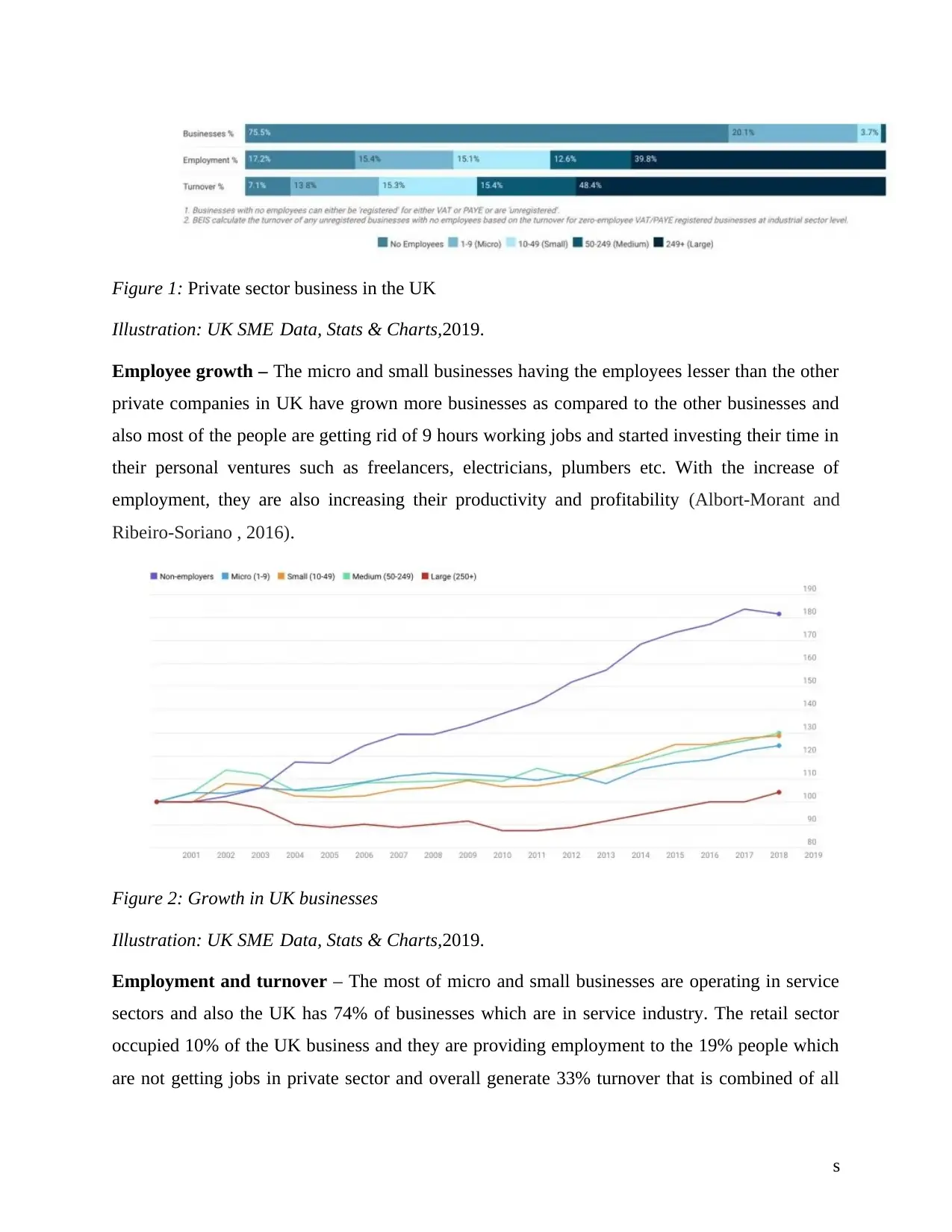
Figure 1: Private sector business in the UK
Illustration: UK SME Data, Stats & Charts,2019.
Employee growth – The micro and small businesses having the employees lesser than the other
private companies in UK have grown more businesses as compared to the other businesses and
also most of the people are getting rid of 9 hours working jobs and started investing their time in
their personal ventures such as freelancers, electricians, plumbers etc. With the increase of
employment, they are also increasing their productivity and profitability (Albort-Morant and
Ribeiro-Soriano , 2016).
Figure 2: Growth in UK businesses
Illustration: UK SME Data, Stats & Charts,2019.
Employment and turnover – The most of micro and small businesses are operating in service
sectors and also the UK has 74% of businesses which are in service industry. The retail sector
occupied 10% of the UK business and they are providing employment to the 19% people which
are not getting jobs in private sector and overall generate 33% turnover that is combined of all
s
Illustration: UK SME Data, Stats & Charts,2019.
Employee growth – The micro and small businesses having the employees lesser than the other
private companies in UK have grown more businesses as compared to the other businesses and
also most of the people are getting rid of 9 hours working jobs and started investing their time in
their personal ventures such as freelancers, electricians, plumbers etc. With the increase of
employment, they are also increasing their productivity and profitability (Albort-Morant and
Ribeiro-Soriano , 2016).
Figure 2: Growth in UK businesses
Illustration: UK SME Data, Stats & Charts,2019.
Employment and turnover – The most of micro and small businesses are operating in service
sectors and also the UK has 74% of businesses which are in service industry. The retail sector
occupied 10% of the UK business and they are providing employment to the 19% people which
are not getting jobs in private sector and overall generate 33% turnover that is combined of all
s
Paraphrase This Document
Need a fresh take? Get an instant paraphrase of this document with our AI Paraphraser
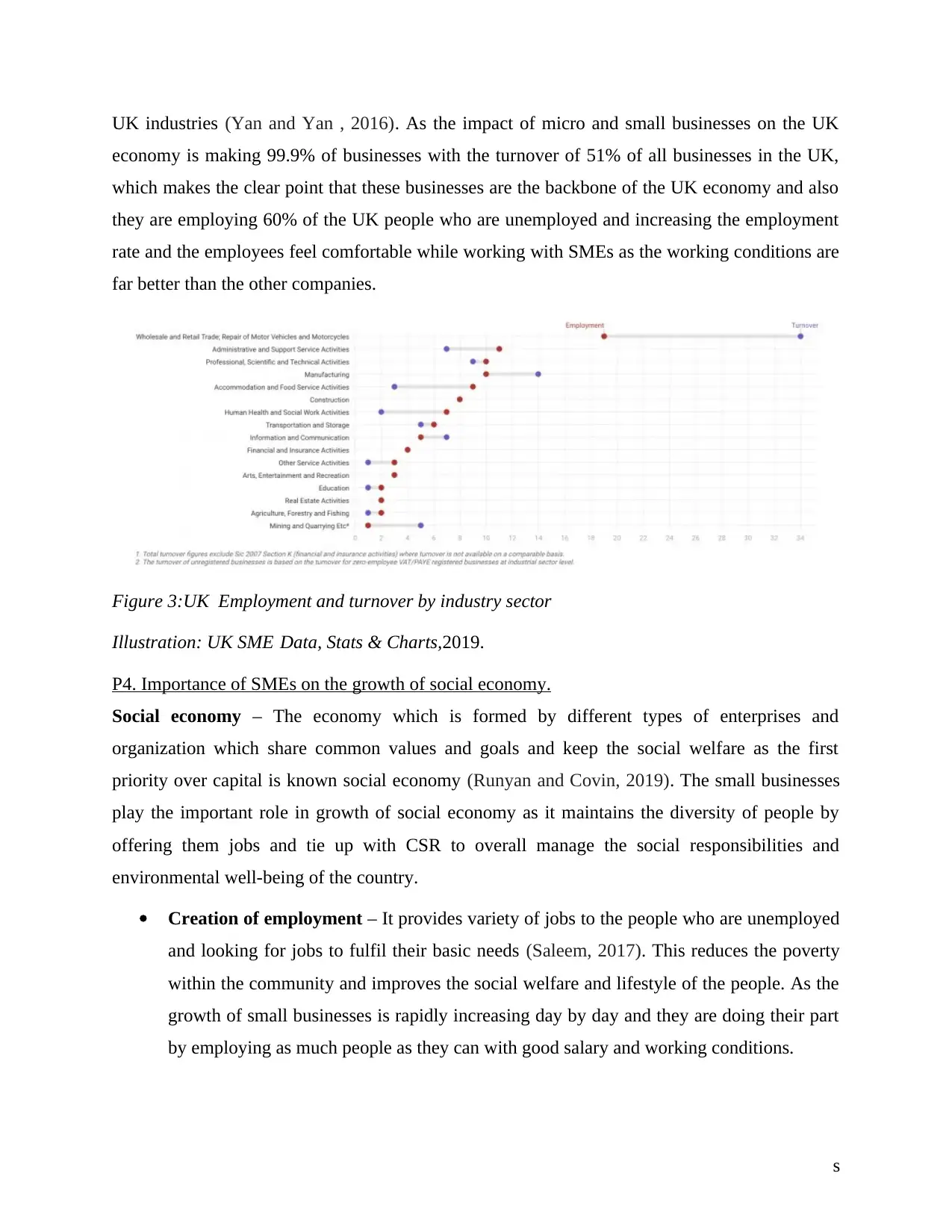
UK industries (Yan and Yan , 2016). As the impact of micro and small businesses on the UK
economy is making 99.9% of businesses with the turnover of 51% of all businesses in the UK,
which makes the clear point that these businesses are the backbone of the UK economy and also
they are employing 60% of the UK people who are unemployed and increasing the employment
rate and the employees feel comfortable while working with SMEs as the working conditions are
far better than the other companies.
Figure 3:UK Employment and turnover by industry sector
Illustration: UK SME Data, Stats & Charts,2019.
P4. Importance of SMEs on the growth of social economy.
Social economy – The economy which is formed by different types of enterprises and
organization which share common values and goals and keep the social welfare as the first
priority over capital is known social economy (Runyan and Covin, 2019). The small businesses
play the important role in growth of social economy as it maintains the diversity of people by
offering them jobs and tie up with CSR to overall manage the social responsibilities and
environmental well-being of the country.
Creation of employment – It provides variety of jobs to the people who are unemployed
and looking for jobs to fulfil their basic needs (Saleem, 2017). This reduces the poverty
within the community and improves the social welfare and lifestyle of the people. As the
growth of small businesses is rapidly increasing day by day and they are doing their part
by employing as much people as they can with good salary and working conditions.
s
economy is making 99.9% of businesses with the turnover of 51% of all businesses in the UK,
which makes the clear point that these businesses are the backbone of the UK economy and also
they are employing 60% of the UK people who are unemployed and increasing the employment
rate and the employees feel comfortable while working with SMEs as the working conditions are
far better than the other companies.
Figure 3:UK Employment and turnover by industry sector
Illustration: UK SME Data, Stats & Charts,2019.
P4. Importance of SMEs on the growth of social economy.
Social economy – The economy which is formed by different types of enterprises and
organization which share common values and goals and keep the social welfare as the first
priority over capital is known social economy (Runyan and Covin, 2019). The small businesses
play the important role in growth of social economy as it maintains the diversity of people by
offering them jobs and tie up with CSR to overall manage the social responsibilities and
environmental well-being of the country.
Creation of employment – It provides variety of jobs to the people who are unemployed
and looking for jobs to fulfil their basic needs (Saleem, 2017). This reduces the poverty
within the community and improves the social welfare and lifestyle of the people. As the
growth of small businesses is rapidly increasing day by day and they are doing their part
by employing as much people as they can with good salary and working conditions.
s
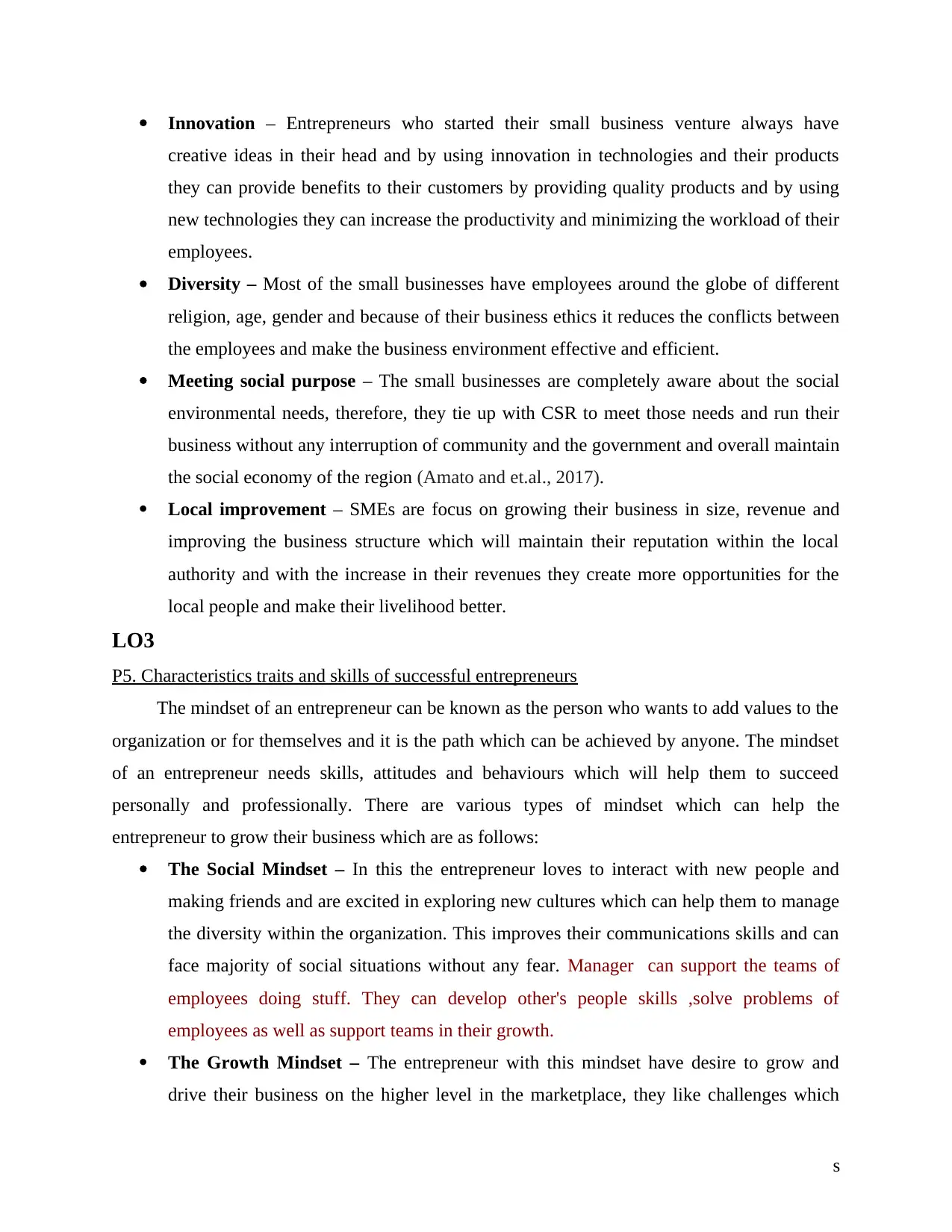
Innovation – Entrepreneurs who started their small business venture always have
creative ideas in their head and by using innovation in technologies and their products
they can provide benefits to their customers by providing quality products and by using
new technologies they can increase the productivity and minimizing the workload of their
employees.
Diversity – Most of the small businesses have employees around the globe of different
religion, age, gender and because of their business ethics it reduces the conflicts between
the employees and make the business environment effective and efficient.
Meeting social purpose – The small businesses are completely aware about the social
environmental needs, therefore, they tie up with CSR to meet those needs and run their
business without any interruption of community and the government and overall maintain
the social economy of the region (Amato and et.al., 2017).
Local improvement – SMEs are focus on growing their business in size, revenue and
improving the business structure which will maintain their reputation within the local
authority and with the increase in their revenues they create more opportunities for the
local people and make their livelihood better.
LO3
P5. Characteristics traits and skills of successful entrepreneurs
The mindset of an entrepreneur can be known as the person who wants to add values to the
organization or for themselves and it is the path which can be achieved by anyone. The mindset
of an entrepreneur needs skills, attitudes and behaviours which will help them to succeed
personally and professionally. There are various types of mindset which can help the
entrepreneur to grow their business which are as follows:
The Social Mindset – In this the entrepreneur loves to interact with new people and
making friends and are excited in exploring new cultures which can help them to manage
the diversity within the organization. This improves their communications skills and can
face majority of social situations without any fear. Manager can support the teams of
employees doing stuff. They can develop other's people skills ,solve problems of
employees as well as support teams in their growth.
The Growth Mindset – The entrepreneur with this mindset have desire to grow and
drive their business on the higher level in the marketplace, they like challenges which
s
creative ideas in their head and by using innovation in technologies and their products
they can provide benefits to their customers by providing quality products and by using
new technologies they can increase the productivity and minimizing the workload of their
employees.
Diversity – Most of the small businesses have employees around the globe of different
religion, age, gender and because of their business ethics it reduces the conflicts between
the employees and make the business environment effective and efficient.
Meeting social purpose – The small businesses are completely aware about the social
environmental needs, therefore, they tie up with CSR to meet those needs and run their
business without any interruption of community and the government and overall maintain
the social economy of the region (Amato and et.al., 2017).
Local improvement – SMEs are focus on growing their business in size, revenue and
improving the business structure which will maintain their reputation within the local
authority and with the increase in their revenues they create more opportunities for the
local people and make their livelihood better.
LO3
P5. Characteristics traits and skills of successful entrepreneurs
The mindset of an entrepreneur can be known as the person who wants to add values to the
organization or for themselves and it is the path which can be achieved by anyone. The mindset
of an entrepreneur needs skills, attitudes and behaviours which will help them to succeed
personally and professionally. There are various types of mindset which can help the
entrepreneur to grow their business which are as follows:
The Social Mindset – In this the entrepreneur loves to interact with new people and
making friends and are excited in exploring new cultures which can help them to manage
the diversity within the organization. This improves their communications skills and can
face majority of social situations without any fear. Manager can support the teams of
employees doing stuff. They can develop other's people skills ,solve problems of
employees as well as support teams in their growth.
The Growth Mindset – The entrepreneur with this mindset have desire to grow and
drive their business on the higher level in the marketplace, they like challenges which
s
⊘ This is a preview!⊘
Do you want full access?
Subscribe today to unlock all pages.

Trusted by 1+ million students worldwide
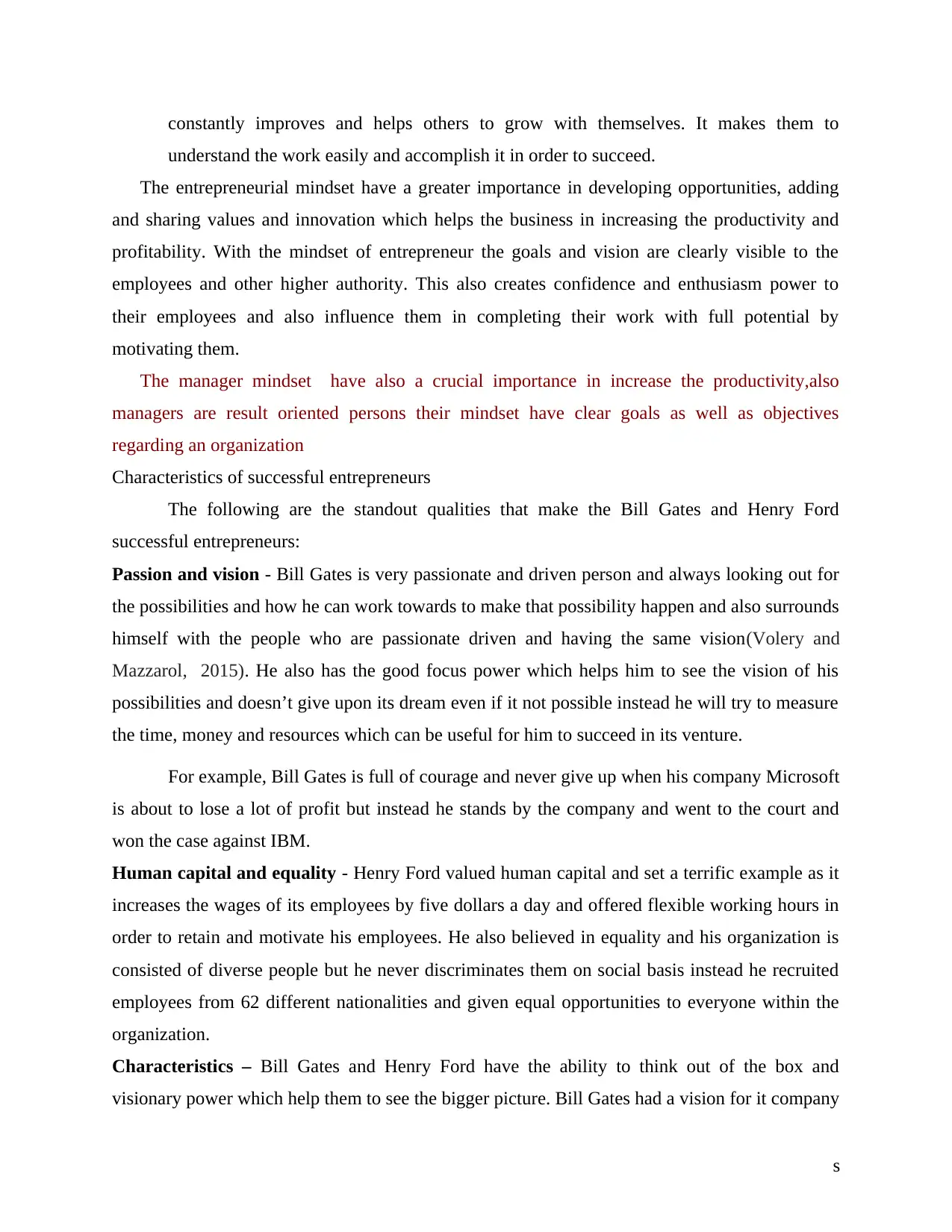
constantly improves and helps others to grow with themselves. It makes them to
understand the work easily and accomplish it in order to succeed.
The entrepreneurial mindset have a greater importance in developing opportunities, adding
and sharing values and innovation which helps the business in increasing the productivity and
profitability. With the mindset of entrepreneur the goals and vision are clearly visible to the
employees and other higher authority. This also creates confidence and enthusiasm power to
their employees and also influence them in completing their work with full potential by
motivating them.
The manager mindset have also a crucial importance in increase the productivity,also
managers are result oriented persons their mindset have clear goals as well as objectives
regarding an organization
Characteristics of successful entrepreneurs
The following are the standout qualities that make the Bill Gates and Henry Ford
successful entrepreneurs:
Passion and vision - Bill Gates is very passionate and driven person and always looking out for
the possibilities and how he can work towards to make that possibility happen and also surrounds
himself with the people who are passionate driven and having the same vision(Volery and
Mazzarol, 2015). He also has the good focus power which helps him to see the vision of his
possibilities and doesn’t give upon its dream even if it not possible instead he will try to measure
the time, money and resources which can be useful for him to succeed in its venture.
For example, Bill Gates is full of courage and never give up when his company Microsoft
is about to lose a lot of profit but instead he stands by the company and went to the court and
won the case against IBM.
Human capital and equality - Henry Ford valued human capital and set a terrific example as it
increases the wages of its employees by five dollars a day and offered flexible working hours in
order to retain and motivate his employees. He also believed in equality and his organization is
consisted of diverse people but he never discriminates them on social basis instead he recruited
employees from 62 different nationalities and given equal opportunities to everyone within the
organization.
Characteristics – Bill Gates and Henry Ford have the ability to think out of the box and
visionary power which help them to see the bigger picture. Bill Gates had a vision for it company
s
understand the work easily and accomplish it in order to succeed.
The entrepreneurial mindset have a greater importance in developing opportunities, adding
and sharing values and innovation which helps the business in increasing the productivity and
profitability. With the mindset of entrepreneur the goals and vision are clearly visible to the
employees and other higher authority. This also creates confidence and enthusiasm power to
their employees and also influence them in completing their work with full potential by
motivating them.
The manager mindset have also a crucial importance in increase the productivity,also
managers are result oriented persons their mindset have clear goals as well as objectives
regarding an organization
Characteristics of successful entrepreneurs
The following are the standout qualities that make the Bill Gates and Henry Ford
successful entrepreneurs:
Passion and vision - Bill Gates is very passionate and driven person and always looking out for
the possibilities and how he can work towards to make that possibility happen and also surrounds
himself with the people who are passionate driven and having the same vision(Volery and
Mazzarol, 2015). He also has the good focus power which helps him to see the vision of his
possibilities and doesn’t give upon its dream even if it not possible instead he will try to measure
the time, money and resources which can be useful for him to succeed in its venture.
For example, Bill Gates is full of courage and never give up when his company Microsoft
is about to lose a lot of profit but instead he stands by the company and went to the court and
won the case against IBM.
Human capital and equality - Henry Ford valued human capital and set a terrific example as it
increases the wages of its employees by five dollars a day and offered flexible working hours in
order to retain and motivate his employees. He also believed in equality and his organization is
consisted of diverse people but he never discriminates them on social basis instead he recruited
employees from 62 different nationalities and given equal opportunities to everyone within the
organization.
Characteristics – Bill Gates and Henry Ford have the ability to think out of the box and
visionary power which help them to see the bigger picture. Bill Gates had a vision for it company
s
Paraphrase This Document
Need a fresh take? Get an instant paraphrase of this document with our AI Paraphraser
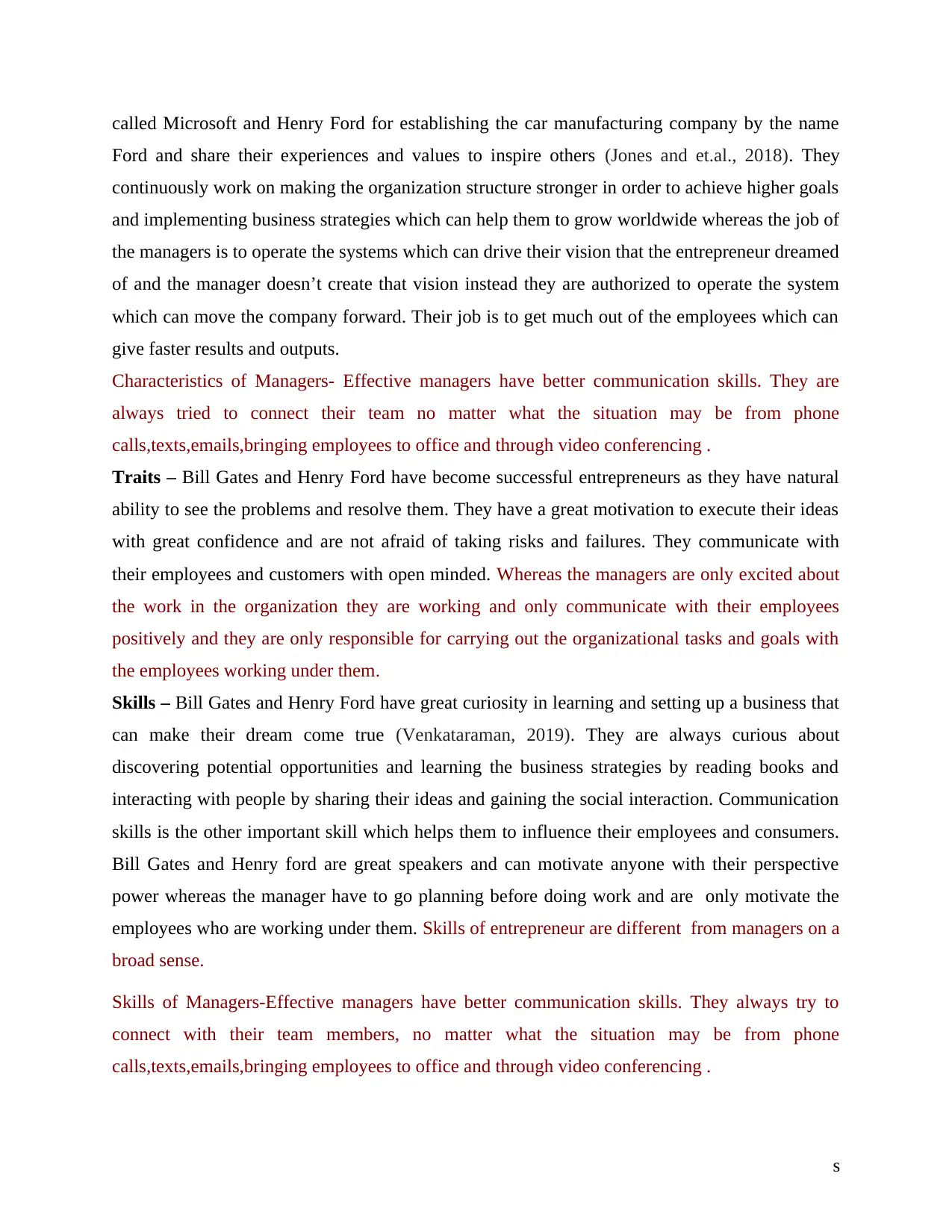
called Microsoft and Henry Ford for establishing the car manufacturing company by the name
Ford and share their experiences and values to inspire others (Jones and et.al., 2018). They
continuously work on making the organization structure stronger in order to achieve higher goals
and implementing business strategies which can help them to grow worldwide whereas the job of
the managers is to operate the systems which can drive their vision that the entrepreneur dreamed
of and the manager doesn’t create that vision instead they are authorized to operate the system
which can move the company forward. Their job is to get much out of the employees which can
give faster results and outputs.
Characteristics of Managers- Effective managers have better communication skills. They are
always tried to connect their team no matter what the situation may be from phone
calls,texts,emails,bringing employees to office and through video conferencing .
Traits – Bill Gates and Henry Ford have become successful entrepreneurs as they have natural
ability to see the problems and resolve them. They have a great motivation to execute their ideas
with great confidence and are not afraid of taking risks and failures. They communicate with
their employees and customers with open minded. Whereas the managers are only excited about
the work in the organization they are working and only communicate with their employees
positively and they are only responsible for carrying out the organizational tasks and goals with
the employees working under them.
Skills – Bill Gates and Henry Ford have great curiosity in learning and setting up a business that
can make their dream come true (Venkataraman, 2019). They are always curious about
discovering potential opportunities and learning the business strategies by reading books and
interacting with people by sharing their ideas and gaining the social interaction. Communication
skills is the other important skill which helps them to influence their employees and consumers.
Bill Gates and Henry ford are great speakers and can motivate anyone with their perspective
power whereas the manager have to go planning before doing work and are only motivate the
employees who are working under them. Skills of entrepreneur are different from managers on a
broad sense.
Skills of Managers-Effective managers have better communication skills. They always try to
connect with their team members, no matter what the situation may be from phone
calls,texts,emails,bringing employees to office and through video conferencing .
s
Ford and share their experiences and values to inspire others (Jones and et.al., 2018). They
continuously work on making the organization structure stronger in order to achieve higher goals
and implementing business strategies which can help them to grow worldwide whereas the job of
the managers is to operate the systems which can drive their vision that the entrepreneur dreamed
of and the manager doesn’t create that vision instead they are authorized to operate the system
which can move the company forward. Their job is to get much out of the employees which can
give faster results and outputs.
Characteristics of Managers- Effective managers have better communication skills. They are
always tried to connect their team no matter what the situation may be from phone
calls,texts,emails,bringing employees to office and through video conferencing .
Traits – Bill Gates and Henry Ford have become successful entrepreneurs as they have natural
ability to see the problems and resolve them. They have a great motivation to execute their ideas
with great confidence and are not afraid of taking risks and failures. They communicate with
their employees and customers with open minded. Whereas the managers are only excited about
the work in the organization they are working and only communicate with their employees
positively and they are only responsible for carrying out the organizational tasks and goals with
the employees working under them.
Skills – Bill Gates and Henry Ford have great curiosity in learning and setting up a business that
can make their dream come true (Venkataraman, 2019). They are always curious about
discovering potential opportunities and learning the business strategies by reading books and
interacting with people by sharing their ideas and gaining the social interaction. Communication
skills is the other important skill which helps them to influence their employees and consumers.
Bill Gates and Henry ford are great speakers and can motivate anyone with their perspective
power whereas the manager have to go planning before doing work and are only motivate the
employees who are working under them. Skills of entrepreneur are different from managers on a
broad sense.
Skills of Managers-Effective managers have better communication skills. They always try to
connect with their team members, no matter what the situation may be from phone
calls,texts,emails,bringing employees to office and through video conferencing .
s
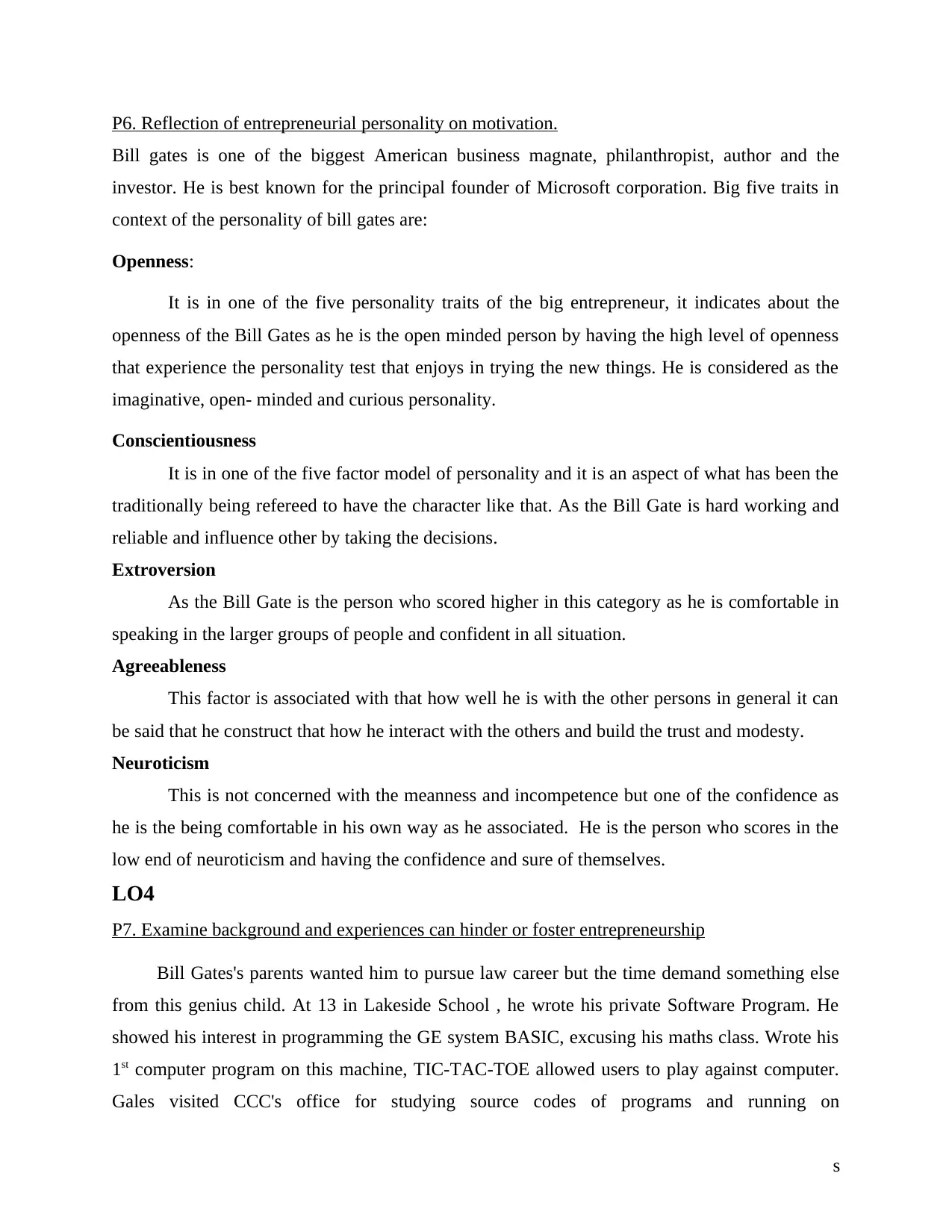
P6. Reflection of entrepreneurial personality on motivation.
Bill gates is one of the biggest American business magnate, philanthropist, author and the
investor. He is best known for the principal founder of Microsoft corporation. Big five traits in
context of the personality of bill gates are:
Openness:
It is in one of the five personality traits of the big entrepreneur, it indicates about the
openness of the Bill Gates as he is the open minded person by having the high level of openness
that experience the personality test that enjoys in trying the new things. He is considered as the
imaginative, open- minded and curious personality.
Conscientiousness
It is in one of the five factor model of personality and it is an aspect of what has been the
traditionally being refereed to have the character like that. As the Bill Gate is hard working and
reliable and influence other by taking the decisions.
Extroversion
As the Bill Gate is the person who scored higher in this category as he is comfortable in
speaking in the larger groups of people and confident in all situation.
Agreeableness
This factor is associated with that how well he is with the other persons in general it can
be said that he construct that how he interact with the others and build the trust and modesty.
Neuroticism
This is not concerned with the meanness and incompetence but one of the confidence as
he is the being comfortable in his own way as he associated. He is the person who scores in the
low end of neuroticism and having the confidence and sure of themselves.
LO4
P7. Examine background and experiences can hinder or foster entrepreneurship
Bill Gates's parents wanted him to pursue law career but the time demand something else
from this genius child. At 13 in Lakeside School , he wrote his private Software Program. He
showed his interest in programming the GE system BASIC, excusing his maths class. Wrote his
1st computer program on this machine, TIC-TAC-TOE allowed users to play against computer.
Gales visited CCC's office for studying source codes of programs and running on
s
Bill gates is one of the biggest American business magnate, philanthropist, author and the
investor. He is best known for the principal founder of Microsoft corporation. Big five traits in
context of the personality of bill gates are:
Openness:
It is in one of the five personality traits of the big entrepreneur, it indicates about the
openness of the Bill Gates as he is the open minded person by having the high level of openness
that experience the personality test that enjoys in trying the new things. He is considered as the
imaginative, open- minded and curious personality.
Conscientiousness
It is in one of the five factor model of personality and it is an aspect of what has been the
traditionally being refereed to have the character like that. As the Bill Gate is hard working and
reliable and influence other by taking the decisions.
Extroversion
As the Bill Gate is the person who scored higher in this category as he is comfortable in
speaking in the larger groups of people and confident in all situation.
Agreeableness
This factor is associated with that how well he is with the other persons in general it can
be said that he construct that how he interact with the others and build the trust and modesty.
Neuroticism
This is not concerned with the meanness and incompetence but one of the confidence as
he is the being comfortable in his own way as he associated. He is the person who scores in the
low end of neuroticism and having the confidence and sure of themselves.
LO4
P7. Examine background and experiences can hinder or foster entrepreneurship
Bill Gates's parents wanted him to pursue law career but the time demand something else
from this genius child. At 13 in Lakeside School , he wrote his private Software Program. He
showed his interest in programming the GE system BASIC, excusing his maths class. Wrote his
1st computer program on this machine, TIC-TAC-TOE allowed users to play against computer.
Gales visited CCC's office for studying source codes of programs and running on
s
⊘ This is a preview!⊘
Do you want full access?
Subscribe today to unlock all pages.

Trusted by 1+ million students worldwide
1 out of 15
Related Documents
Your All-in-One AI-Powered Toolkit for Academic Success.
+13062052269
info@desklib.com
Available 24*7 on WhatsApp / Email
![[object Object]](/_next/static/media/star-bottom.7253800d.svg)
Unlock your academic potential
Copyright © 2020–2026 A2Z Services. All Rights Reserved. Developed and managed by ZUCOL.




